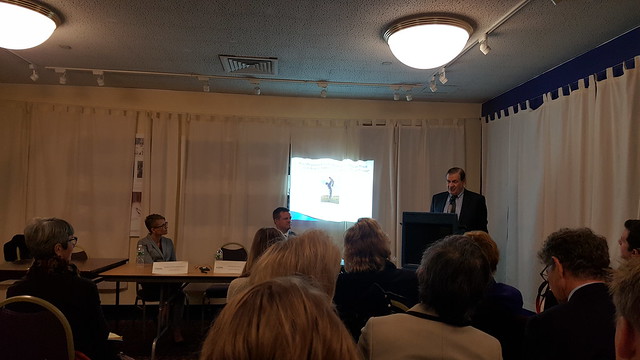New York, United States—Parents’ influence on their children achieving gender equality and realizing their full potential was the theme of a UPF-sponsored parallel event to the United Nations Commission on the Status of Women (CSW).
“Gender Empowerment Begins at Home” was the title of the event, held by UPF, together with the Committee on the Family and other NGOs, on March 12, 2019, at the Armenian Center located near UN headquarters.
This year’s theme for the Commission on the Status of Women, held at UN Headquarters, was “Social Protection Systems, Access to Public Services and Sustainable Infrastructure for Gender Equality and Empowerment of Women and Girls.”
Dr. Kyle Pruett, a clinical professor of child psychiatry and director of medical studies at the Yale School of Medicine’s Child Study Center, who is also an award-winning researcher, shared his knowledge of the critical influence that parents have on their children.
Dr. Pruett has authored several publications, such as Fatherneed: Why Father Care Is as Essential as Mother Care to Your Child and Partnership Parenting: How Men and Women Parent Differently—Why It Helps Your Kids and Can Strengthen Your Marriage.
He stated with passion how important parental involvement is for healthy neurological development in the first 1,000 days of a child’s life. Sadly, he said, “We spend way too much money, too late, investing in children’s development, when clearly the critical time for investment for the sake of every child’s future is the first three years of life.”
He referred to data showing that skin-to-skin contact between a newborn and his/her father in the first two hours of life resulted in a much calmer baby overall.
Dr. Pruett then exposed some myths about differences in how fathers and mothers behave and respond to their children. For example, studies found that fathers distinguish their newborn from other newborns just as well as the mothers can, he said.
Although distressed newborns generally seek and respond more to the mother’s care as opposed to the father’s, Dr. Pruett said, by 18 months the toddler has an equal preference for his mother and father and may prefer the father after that age.
Dr. Pruett discussed the tendency of fathers to encourage a frustrated child to resolve a problem by themselves (such as a puzzle or math problem), intervening less than most mothers would. Fathers, according to Dr. Pruett, respond to their child with 90 percent unpredictability, compared to mothers, who tend to provide a more predictable regulating response. The impact of this fathering style helps boys and girls learn to deal with stress and disappointments with less aggression, especially compared to un-fathered children, Dr. Pruett explained.
He conveyed the essential impact of involved fathers on their children, mentioning reduced juvenile delinquency and delayed sexual activity, compared to children without engaged fathers. He discussed a study that showed parenting support groups with both the mother and father were far more effective in reducing child aggression and couple stress than parenting groups that separated fathers and mothers.
Dr. Pruett’s presentation was rich with interesting research, making the point clear that engaged fathers are key for optimal child development, that the earliest parent-child relationship needs much more attention and strengthening, and that helping the couple learn to work together as a parenting team offers the greatest benefit to the whole family.
Our second speaker, Dr. Christia Spears Brown, a professor in the Department of Psychology, University of Kentucky, and author of Parenting beyond Pink & Blue: How to Raise Your Kids Free of Gender Stereotypes, spoke about the benefit of parents reducing stereotyping behavior toward their children.
Dr. Spears Brown emphasized that the differences in scoring of capacities of girls and boys, such as in mathematics, is largely due to girls’ “confidence gap” due to messages, subtle or not, given to them by their parents. According to the speaker, parents convey to girls that they are not good at math by their comments or by intervening much more quickly with a daughter’s math homework than with a son’s homework.
She referred to international data indicating that 52 percent of parents expect that their son could go into STEM (science, technology, engineering and mathematics), but only 19 percent of parents expect the same for their daughter. Dr. Spears Brown said that parents often offer different toys to their children, which has an influence on developing or decreasing mathematical thinking and spatial visualizing. She suggested that parents encourage boys to play with dolls and help with domestic tasks at home and that girls be encouraged to develop spatial and mathematical thinking by offering Legos and exposing them to activities leading to an interest in science.
She underlined how important the influence of parents is, especially in the first four years, when the brain develops the fastest. Dr. Spears Brown made the point that reduced reinforcement of stereotypic behavior from parents also will help both sexes have a wider spectrum of capacities as mothers and fathers.
In the question-and-answer period, one home-schooling mother commented that she and her husband had provided a home environment that was intentionally very un-stereotyping, as she was clearly STEM-oriented while her husband was not. In their home schooling, she and her husband consciously encouraged both sons and daughters equally in all areas. Despite the parents’ concerted efforts, she said, her daughters are neither drawn to nor particularly strong in math and yet her sons are.
Dr. Spears Brown replied there are still unconscious parental influences at play, which are hard to extinguish or be aware of. She argued that parents should make greater effort to guide their children to discover and develop their natural talents by providing encouragement and opportunities devoid of stereotyping. Her point is well taken, but certainly parents have not failed if boys and girls still choose to follow more stereotypical fields.

